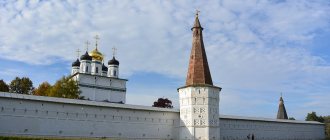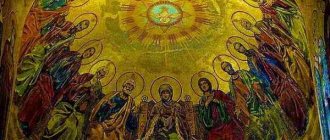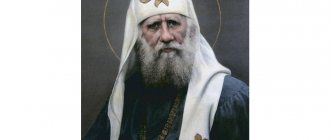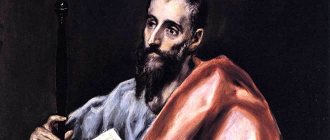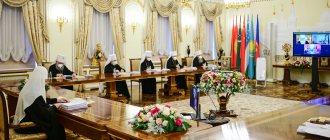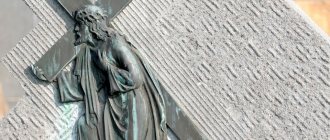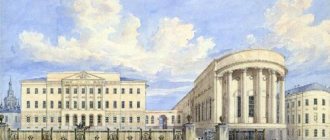Life
The Monk Euphrosynus, a monk of one of the Palestinian monasteries, was obedient in the kitchen, working as a cook. While working for the brethren, the Monk Euphrosynus did not separate his thoughts from God, remaining in prayer and fasting. He always remembered that obedience is the first duty of a monk, and therefore he humbly obeyed his elder brothers. The saint's patience was amazing: he was often reproached, but he did not grumble and endured all the troubles with equanimity. With his inner virtue, hidden from people, Saint Euphrosynus pleased the Lord, Who Himself revealed to the monastic brethren the spiritual heights of their humble brother. One of the monastery elders in prayer asked God to show him the blessings prepared for the righteous in the next century. The priest saw in a dream that he was in paradise and contemplated with fear and joy its indescribable beauty. There he also saw the monk of his monastery, the cook Euphrosynus. Surprised by this meeting, the presbyter asked Euphrosynus how he ended up here. The saint answered him that he was in heaven by the great mercy of God. He again asked whether Euphrosynus had the power to give him anything from the beauties surrounding them. The Monk Euphrosynus invited the priest to choose what he wanted, and he pointed to the beautiful apples growing in the Garden of Eden. The monk picked three apples, wrapped them in a scarf and handed them to his interlocutor. Waking up before the beginning of Matins, the priest mistook the vision for an ordinary dream, but suddenly noticed near him a handkerchief with the fruits of paradise wrapped in it, emitting a wonderful fragrance. The priest, finding St. Euphrosynus in the church, asked him under oath where he had been that night. The saint replied that he was where the priest was. Then the monk said that the Lord, fulfilling the priest’s prayer, showed him paradise and gave him the fruits of paradise through him, the evil and unworthy servant of God Euphrosyne. At the end of Matins, the priest told the brethren of the monastery about everything, pointing to the spiritual height of the monk Euphrosynus, a hidden saint of God, and showed the fragrant fruits of paradise. Deeply moved by what they heard, the monks went to the kitchen to venerate the Monk Euphrosynus, but did not find him there: avoiding human glory, the saint left the monastery. The place where he disappeared remained unknown, but the monks always remembered that paradise had been opened to their brother, the Monk Euphrosynus, and they, saved by the grace of God, would meet him there. They sacredly kept the apples of paradise and gave them out in pieces for blessing and healing.
Icon of St. Euphrosyne the Cook
VERY RARE ICON OF THE PATRON OF CULINARY
REVEREND EPHROSYNUS THE PATRON OF COOKS
Save it to your wall so you know who to pray to while cooking!
Before preparing food, you must read the prayer: “Lord Jesus Christ, Son of God, through the prayers of St. Euphrosynus the cook, help me prepare this food for Your Glory. Amen.” (Bow).
The Monk Euphrosynus suffered for the Lord and was awarded a crown from God. Saint Euphrosynus is a true cook, the patron saint of all Orthodox cooks. His memory is celebrated on September 11 (24).
Grace is given and taken away through food. The process of eating is not as insignificant as it seems - it is a mystical act through which a person receives vital substances. They need to be strengthened, awakened; it makes a blessing. A person who prays before preparing food saturates it with God's omnipotence.
Why is the food always so delicious in monasteries, even though it is the simplest? That’s why they prepare it with prayer. It is very important. Prayer should always accompany a person’s work.
In the 9th century. In one of the communal monasteries in Egypt there lived a monk named Euphrosynus. He came from humble parents, but in his virtues he surpassed the most noble by birth.
The monastery in which this saint labored had at that time four hundred monks. Euphrosynus prepared food for the brethren. He bore the obedience of the cook with great humility and patience.
Because of his obedience, Euphrosynus walked around always dirty from soot, stained with soot, spreading the smells of the kitchen. Therefore, the brethren treated him with disdain and, moreover, many mocked and mocked him. Euphrosynus humbly endured, not complaining to anyone. The only thing that consoled his soul was prayer, tireless mental prayer: “Lord Jesus Christ, have mercy on me.” The humble Euphrosynus prayed incessantly, and his hands, which knew no idleness, worked incessantly. He served the Lord in secret so that he would be rewarded openly, as indeed it was.
The abbot of the monastery drew the attention of Euphrosynus’ humility. He suggested that dirty, grimy Euphrosynus, from whom no one had ever heard a single word, must have had a gift from God, but just what kind. The abbot prayed to God and in the evening had such a vision. It is as if he is in heaven, as the Holy Scriptures depict it. There he sees an apple tree and reaches out his hand to pick an apple. However, as soon as he reaches out to the apple tree, the tree raises its branches. This was repeated several times: the abbot would stretch out his hand, and the apple tree would raise its branches; when he would withdraw his hand, he would lower the branches. Then Euphrosynus appears out of nowhere and asks the abbot: “Holy abbot, what are you doing here?” And the abbot replies: “I’m trying, Father Euphrosynus, to pick an apple, but the apple tree won’t let me do it.” Then Euphrosynus stretched out his hand and picked three apples for the abbot. At that moment, the abbot woke up and was surprised to find that he was holding in his hands the apples that he had received in a vision from Euphrosynus.
At this time, the church bell was struck - the brethren gathered for the service of Midnight and Matins, and Euphrosynus remained in the kitchen - he had to prepare food. But on this day the abbot demanded to call Euphrosynus, and if he refused, then to bring him to the temple by force. And so, to the surprise of all the brethren, the cook was brought to the temple. Before starting the midnight service, the abbot turned to Euphrosynus: “Where were you last night?” The humble Euphrosynus was silent, but the abbot ordered him to obey and answer. Then Euphrosynus said: “Holy abbot, we were together.” The abbot, holding fragrant apples in his hands, asked in amazement: “Do you recognize these apples?” - “Yes, holy abbot! - answered the cook. “These are the apples that I picked for you.” You, father, asked the Lord to show you in a sensual form the reward of His servants, and the Lord deigned to show this to your reverence through me, bad and unworthy, and now you saw me in paradise.” The abbot, with a feeling of repentance, bowed to the ground before Euphrosynus, and behind him the cook and the monks, who had mocked and mocked him for many years, began to ask for forgiveness. Then the abbot, at the holy paten, cut the apples of paradise into small pieces and distributed them to the brethren as a sign of blessing instead of the antidoron.
So Euphrosynus brought the fruit of purity, obedience and humility, for all the years he lived humbly and with prayer on his lips. On the same day, Euphrosynus secretly left the monastery: he wanted to live his life avoiding human glory, and strived for only one thing - to offer his prayers to God.
Source of the article: https://vk.com/wall-128633693_5356
Euphrosyne the cook's prayer
From your youth, your mind was fixed on God, / blessed Euphrosyne, / you rejected the world, / you moved into the impassable desert, / and there, from the Lord we strengthen you, / in prayers and valiant offerings. you lived, / and your life was painful / by murder You died from the sons of disobedience, / for this reason you were married with the saints and martyrs, / with them you now stand before the Throne of the Most Holy Trinity. / We pray this, we pray to you, / to forgive the tax of our sins // and grant us great mercy.
From your youth, you fixed your mind on God, / Blessed Euphrosyne, / and, fleeing the vanity of this world, / you reached the impassable desert, / in the image of God, I strengthen you, / having acquired the life of angels, / you have worked well enough for your Master Christ / in forgiveness, both in prayers and in all-night vigils / and you were granted the gift of the Most Holy Spirit, / to prophesy the future, / guiding on the path of repentance / those who flow to you and listen to you. / Moreover, the All-Good God, seeing your great faith in Himself, / unfeigned love and undoubted hope, / granted you not only to believe in Him, / but also to suffer for Him, / always From the nasty sons in the same desert your blood was poured out mercilessly. / And to this day, like Abel, she cries out to God, / bearing witness to this through the incorruption of your relics. / Looking at you, we cry out tenderly: / glory to Christ, who has given you so much grace, // also pray for us.
Imitating the life of the ancient fathers, / the God-wise Father Euphrosyne, / you hated the beauty of this world, / and, having moved into the desert, / you took the faith of Christ, like a shield, into your heart behold, / thou hast departed from the south, as a good warrior of the King of Heaven, / not to fight against flesh and blood, / but to fight against the wiles of the invisible enemy, / and this exalted pride, / according to the grace given to you from the Holy Spirit, / by your deep humility you have cast down, / and from the Heavenly Rewarder you were crowned with an unfading crown of victory . / For this reason, having come together in love, we cry out to you: // Rejoice, Father Euphrosyne, desert decoration.
O holy venerable martyr Euphrosyne! Hear our fervent prayer brought to you. Protect and protect with your holy prayers all this and all the villages and cities of our Orthodox Fatherland from famine, cowardice, flood, fire, sword, invasion of foreigners, internecine warfare and death I am ulcers, from all misfortune, sorrow and evil. Pray to the Lord God and our Savior to grant peace to His Church, under the sign of the Militant Cross, by the archpastor and shepherd of our right to rule, the word of the truth of the Gospel, through your intercession, help and justice to all Ask true Christians for forgiveness of their sins, voluntary and involuntary, and grant healing from illnesses to those who are ill through your intercession. May the most honorable and magnificent name of the Most Holy Trinity, the Father and the Son and the Holy Spirit be glorified for your sake, now and forever, and to the ages of ages. Amen.
Rare Liturgical Texts
Rare liturgical texts and translations of liturgical texts into Church Slavonic are posted here. Not all of them have yet been approved by the Divine Judicial Commission. We publish only services, troparia, kodaki and akathists.
Euphrosynus Cook St. Troparion
Venerable Euphrosynus the Cook
Troparion, tone 5. Similar to: Co-Original Word: By humility of the heart, Father Euphrosyus, / offering your service in the kitchen, / fulfilling the truth of the Holy Spirit, / for this sake as a priest God show us your glory to the venerables, and show it to us, God-bearing behold, as partakers with your prayers.
Hello, can you tell me where to find the Akathist to Euphrosyne the Cook? Thank you in advance.
Hello, can you tell me where to find the Akathist to Euphrosyne the Cook? Thank you in advance.
Unfortunately, no, and I doubt that it exists.
Euphrosyne the cook's prayer
The last ten days of September are bright in this regard: Godfathers Joachim and Anna, First Martyr Stephen, St. John Chrysostom, Great Martyr Euphemia All-Praised, Martyr Lyudmila of Czech, Martyrs Vera, Nadezhda, Love and their mother Sophia, Saints Macarius of Optina, Alexander Peresvet and Andrey Oslyabya, Joseph Volotsky, Silouan of Athos, Sergius and Herman of Valaam, righteous Simeon of Verkhoturye. Not to mention two great holidays - the Nativity of the Blessed Virgin Mary and the Exaltation of the Holy Cross. The last two days of the month especially attract attention in Russia, where many Orthodox girls and women - Lyudmila, Sofia, Vera, Nadezhda and Lyubov - celebrate their name days. Therefore, the focus of our attention these days is usually focused on these illustrious saints.
At the same time, we sometimes don’t even know which saints lovingly care about us, about our salvation, watch over us and protect us with reverent prayer. I came across evidence of this in various sources; unfortunately, I cannot provide links now. But the point is that sometimes people were surprised to learn that certain saints cared for them in a special way.
This tireless love of the saints, who in spirit see our weaknesses and obstacles on the path to salvation, our sorrows and needs, reveals to us the world of unity in Christ, to which we are all called. And each of us is probably familiar with the feeling of some special internal craving for certain righteous people, the desire for their special veneration. And there is also the feeling that if it were not for the care of the Mother of God, the Guardian Angel, “my” saint and, perhaps, some other saints, I would have disappeared 20 times. Or 100. Or more. The following circumstances prompted me to create this diary - a special feeling for some saints, which will be discussed below, the congratulations of Melitina (a rare name and little-known saint to us!) and the “discovery” that on September 29, in addition to the memory of Saint Lyudmila, the memory of the reverent Great Martyr Euphemia is celebrated All-praiseworthy (shame on me, I keep getting confused in the last days of September!), as well as the righteous Alexy Mechev (my nephew is named after him, yesterday was the second day of remembrance, the transfer of relics). Alexandra wrote about Saint Kuksha of Odessa in her diary below. And on this day we remember our new martyrs who suffered under Soviet rule: holy martyrs Grigory Raevsky and Sergius Losev.
A good video version, in my opinion. It also tells why the Great Martyr Euphemia is called All-Praised. In our days, according to the testimony of St. Paisius the Holy Mountain, the Great Martyr Euphemia appeared to him.
The Monk Paisius said: “The saint is so fragile, weak – and how did she withstand the terrible torment? It would be okay if she were a big, strong woman. Otherwise, that’s all the soul could hold on to.”
“When she told me about her torment for Christ, I not only heard, but seemed to see and experience this torment. I was overcome with trepidation and horror! Oh, what agony she went through.
“How did you withstand such torment?” – I asked her. “If I had known the glory of the Saints, I would have done everything possible to suffer even greater torment,” she replied.
By the way, St. Euphrosynus is the patron saint of Orthodox cooks. Before preparing food, they read a prayer: “Lord, bless us to prepare this food for Your glory through the prayers of Euphrosynus the cook.” . All saints, pray to God for us! PS Forgive me for the long diary; There was a need to write (and then I had to cut down what I wanted). I understand that everything is fine in due time, I started yesterday, but did not manage to complete it in time.
Venerable Euphrosynus – patron saint of cooks
St. Euphrosynus is the patron saint of cooks. Cooks in Greek monasteries know his life well and always pray to this amazing ascetic. Before preparing food, they read a prayer: “Lord, bless us to prepare this food for Your glory through the prayers of Euphrosynus the cook.”
In the 9th century. In one of the communal monasteries in Egypt there lived a monk named Euphrosynus. He came from humble parents, but in his virtues he surpassed the most noble by birth.
The monastery in which this saint labored had at that time four hundred monks. Euphrosynus prepared food for the brethren. He bore the obedience of the cook with great humility and patience.
Because of his obedience, Euphrosynus walked around always dirty from soot, stained with soot, spreading the smells of the kitchen. Therefore, the brethren treated him with disdain and, moreover, many mocked and mocked him. Euphrosynus humbly endured, not complaining to anyone. The only thing that consoled his soul was prayer, tireless mental prayer: “Lord Jesus Christ, have mercy on me.” The humble Euphrosynus prayed incessantly, and his hands, which knew no idleness, worked incessantly. He served the Lord in secret so that he would be rewarded openly, as indeed it was.
The abbot of the monastery drew the attention of Euphrosynus’ humility. He suggested that dirty, grimy Euphrosynus, from whom no one had ever heard a single word, must have had a gift from God, but just what kind. The abbot prayed to God and in the evening had such a vision. It is as if he is in heaven, as the Holy Scriptures depict it. There he sees an apple tree and reaches out his hand to pick an apple. However, as soon as he reaches out to the apple tree, the tree raises its branches. This was repeated several times: the abbot would stretch out his hand, and the apple tree would raise its branches; when he would withdraw his hand, he would lower the branches. Then Euphrosynus appears out of nowhere and asks the abbot: “Holy abbot, what are you doing here?” And the abbot replies: “I’m trying, Father Euphrosynus, to pick an apple, but the apple tree won’t let me do it.” Then Euphrosynus stretched out his hand and picked three apples for the abbot. At that moment, the abbot woke up and was surprised to find that he was holding in his hands the apples that he had received in a vision from Euphrosynus.
At this time, the church bell was struck - the brethren gathered for the service of Midnight and Matins, and Euphrosynus remained in the kitchen - he had to prepare food. But on this day the abbot demanded to call Euphrosynus, and if he refused, then to bring him to the temple by force. And so, to the surprise of all the brethren, the cook was brought to the temple. Before starting the midnight service, the abbot turned to Euphrosynus: “Where were you last night?” The humble Euphrosynus was silent, but the abbot ordered him to obey and answer. Then Euphrosynus said: “Holy abbot, we were together.” The abbot, holding fragrant apples in his hands, asked in amazement: “Do you recognize these apples?” - “Yes, holy abbot! - answered the cook. “These are the apples that I picked for you.” You, father, asked the Lord to show you in a sensual form the reward of His servants, and the Lord deigned to show this to your reverence through me, bad and unworthy, and now you saw me in paradise.” The abbot, with a feeling of repentance, bowed to the ground before Euphrosynus, and behind him the cook and the monks, who had mocked and mocked him for many years, began to ask for forgiveness. Then the abbot, at the holy paten, cut the apples of paradise into small pieces and distributed them to the brethren as a sign of blessing instead of the antidoron.
Venerable Euphrosynus – patron saint of cooks
St. Euphrosynus is the patron saint of cooks. Cooks in Greek monasteries know his life well and always pray to this amazing ascetic. Before preparing food, they read a prayer: “Lord, bless us to prepare this food for Your glory through the prayers of Euphrosynus the cook.”
In the 9th century. In one of the communal monasteries in Egypt there lived a monk named Euphrosynus. He came from humble parents, but in his virtues he surpassed the most noble by birth.
The monastery in which this saint labored had at that time four hundred monks. Euphrosynus prepared food for the brethren. He bore the obedience of the cook with great humility and patience.
Because of his obedience, Euphrosynus walked around always dirty from soot, stained with soot, spreading the smells of the kitchen. Therefore, the brethren treated him with disdain and, moreover, many mocked and mocked him. Euphrosynus humbly endured, not complaining to anyone. The only thing that consoled his soul was prayer, tireless mental prayer: “Lord Jesus Christ, have mercy on me.” The humble Euphrosynus prayed incessantly, and his hands, which knew no idleness, worked incessantly. He served the Lord in secret so that he would be rewarded openly, as indeed it was.
The abbot of the monastery drew the attention of Euphrosynus’ humility. He suggested that dirty, grimy Euphrosynus, from whom no one had ever heard a single word, must have had a gift from God, but just what kind. The abbot prayed to God and in the evening had such a vision. It is as if he is in heaven, as the Holy Scriptures depict it. There he sees an apple tree and reaches out his hand to pick an apple. However, as soon as he reaches out to the apple tree, the tree raises its branches. This was repeated several times: the abbot would stretch out his hand, and the apple tree would raise its branches; when he would withdraw his hand, he would lower the branches. Then Euphrosynus appears out of nowhere and asks the abbot: “Holy abbot, what are you doing here?” And the abbot replies: “I’m trying, Father Euphrosynus, to pick an apple, but the apple tree won’t let me do it.” Then Euphrosynus stretched out his hand and picked three apples for the abbot. At that moment, the abbot woke up and was surprised to find that he was holding in his hands the apples that he had received in a vision from Euphrosynus.
At this time, the church bell was struck - the brethren gathered for the service of Midnight and Matins, and Euphrosynus remained in the kitchen - he had to prepare food. But on this day the abbot demanded to call Euphrosynus, and if he refused, then to bring him to the temple by force. And so, to the surprise of all the brethren, the cook was brought to the temple. Before starting the midnight service, the abbot turned to Euphrosynus: “Where were you last night?” The humble Euphrosynus was silent, but the abbot ordered him to obey and answer. Then Euphrosynus said: “Holy abbot, we were together.” The abbot, holding fragrant apples in his hands, asked in amazement: “Do you recognize these apples?” - “Yes, holy abbot! - answered the cook. “These are the apples that I picked for you.” You, father, asked the Lord to show you in a sensual form the reward of His servants, and the Lord deigned to show this to your reverence through me, bad and unworthy, and now you saw me in paradise.” The abbot, with a feeling of repentance, bowed to the ground before Euphrosynus, and behind him the cook and the monks, who had mocked and mocked him for many years, began to ask for forgiveness. Then the abbot, at the holy paten, cut the apples of paradise into small pieces and distributed them to the brethren as a sign of blessing instead of the antidoron.
So Euphrosynus brought the fruit of purity, obedience and humility, for all the years he lived humbly and with prayer on his lips. On the same day, Euphrosynus secretly left the monastery: he wanted to live his life avoiding human glory, and strived for only one thing - to offer his prayers to God.
The Monk Euphrosynus suffered for the Lord and was awarded a crown from God. Saint Euphrosynus is a true cook, the patron saint of all Orthodox cooks. His memory is celebrated on September 11 (24).
